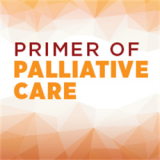Primer of Palliative Care, 7th Edition

This essential introductory guide is the perfect resource for all members of the palliative care team who care for patients with serious illness and their families.
Category
- Pediatrics
- Pain Management
- Non-Pain Symptom Management
- Medical/Clinical Knowledge
- Disease Trajectories and Prognosis
- Core Content
Format
- Paperback Book (shipped)
Credits
Cost $60.00
HMD PREP 2nd Edition (Reviewed 2022)

PLEASE READ: This activity was recently reviewed and edited to ensure the content is accurate. CME/MOC expiration dates have been extended through January 28, 2026 and may only be claimed one time.
Category
- Hospice
Format
- Interactive Enduring Activity
Credits
- 5.00 ABIM MOC
- 5.00 ABP MOC
- 5.00 CME (physician only)
- 5.00 Participation
Cost $315.00
Innovations in Home Based Care Models Micro-Learning Flight

Home based palliative care is moving beyond the borders of the hospital into community home settings.
Category
Format
- Video
Credits
- 1.00 ABA MOC
- 1.00 ABIM MOC
- 1.00 ABP MOC
- 1.00 ABS MOC
- 1.00 CME (physician only)
- 1.00 Participation
Cost $49.00
Bringing NCP Domain 5 to Life Within Your Hospice and Palliative Care Practice Micro-Learning Flight

Palliative care clinicians are advocates for whole-person care, addressing symptoms and protecting what is most important to people living with serious illness, yet many palliative care clinicians lack clarity about how best to collaborate with spiritual caregivers to champion spiritual, religiou
Category
- Academic/Education Strategies
Format
- Video
Credits
Cost $0.00
Management of Depression Refractory to First-Line Therapies Micro-Learning Flight

Expert insights from an interdisciplinary team of psychiatry-trained palliative care physicians and pharmacy will discuss cross-tapering, medication augmentation, Ketamine, and Electroconvulsive therapy (ECT) therapeutic strategies for patients experiencing depression who do not benefit from initial antidepressant trails.
Category
Format
- Video
Credits
- 1.25 ABIM MOC
- 1.25 ABS MOC
- 1.25 CME (physician only)
- 1.25 Participation
Cost $60.00
HMD 2024 Update and Exam Prep

Study from your desktop to prepare for the Hospice Medical Director Certification Board (HMDCB) examination or use as a resource to advance your knowledge in hospice and palliative medicine best practices.
Category
- Board Prep
Format
- Video
Credits
- 7.00 ABIM MOC
- 7.00 CME (physician only)
- 7.00 Participation
Cost $450.00
Essentials in Pediatric Hospice: Trends and Opportunities

PLEASE READ: This activity is repurposed from the live webinar that took place in April 2024. If you have accessed and claimed your CE credit prior, you cannot claim credit again.
Category
- Pediatrics
Format
- Video
Credits
- 1.00 ABA MOC
- 1.00 ABIM MOC
- 1.00 ABP MOC
- 1.00 ABS MOC
- 1.00 CME (physician only)
- 1.00 Participation
Cost $45.00
2023 Grand Rounds: Year in Reflection

This activity includes the recordings of the three Grand Rounds that were held in 2023.
Category
- Research/Quality Improvement
- Leadership Development
- DEI: Addressing Disparities/Advancing Equity
Format
- Video
Credits
- 3.00 ABA MOC
- 3.00 ABIM MOC
- 3.00 ABP MOC
- 3.00 ABS MOC
- 3.00 CME (physician only)
- 3.00 Participation
Cost $120.00
Caring for Patients Nearing Life’s End: Managing Symptoms in the Final Weeks, Days and Hours of Living

PLEASE READ: This activity is repurposed from the live webinar that took place in September 2023. If you have accessed and claimed your CE credit prior, you cannot claim credit again.
Category
- Medical/Clinical Knowledge
Format
- Video
Credits
- 1.00 ABIM MOC
- 1.00 CME (physician only)
- 1.00 Participation
Cost $49.00
ABIM's Longitudinal Knowledge Assessment (LKA): Is it for me?

Learn what you need to know to decide whether the Longitudinal Knowledge Assessment (LKA) or the 10-year exam works best for you. AAHPM is collaborating with the American Board of Internal Medicine (ABIM) assessments to answer your questions.
Category
- Board Prep
Format
- Video
Credits
Cost $0.00

 Facebook
Facebook Twitter
Twitter LinkedIn
LinkedIn Forward
Forward